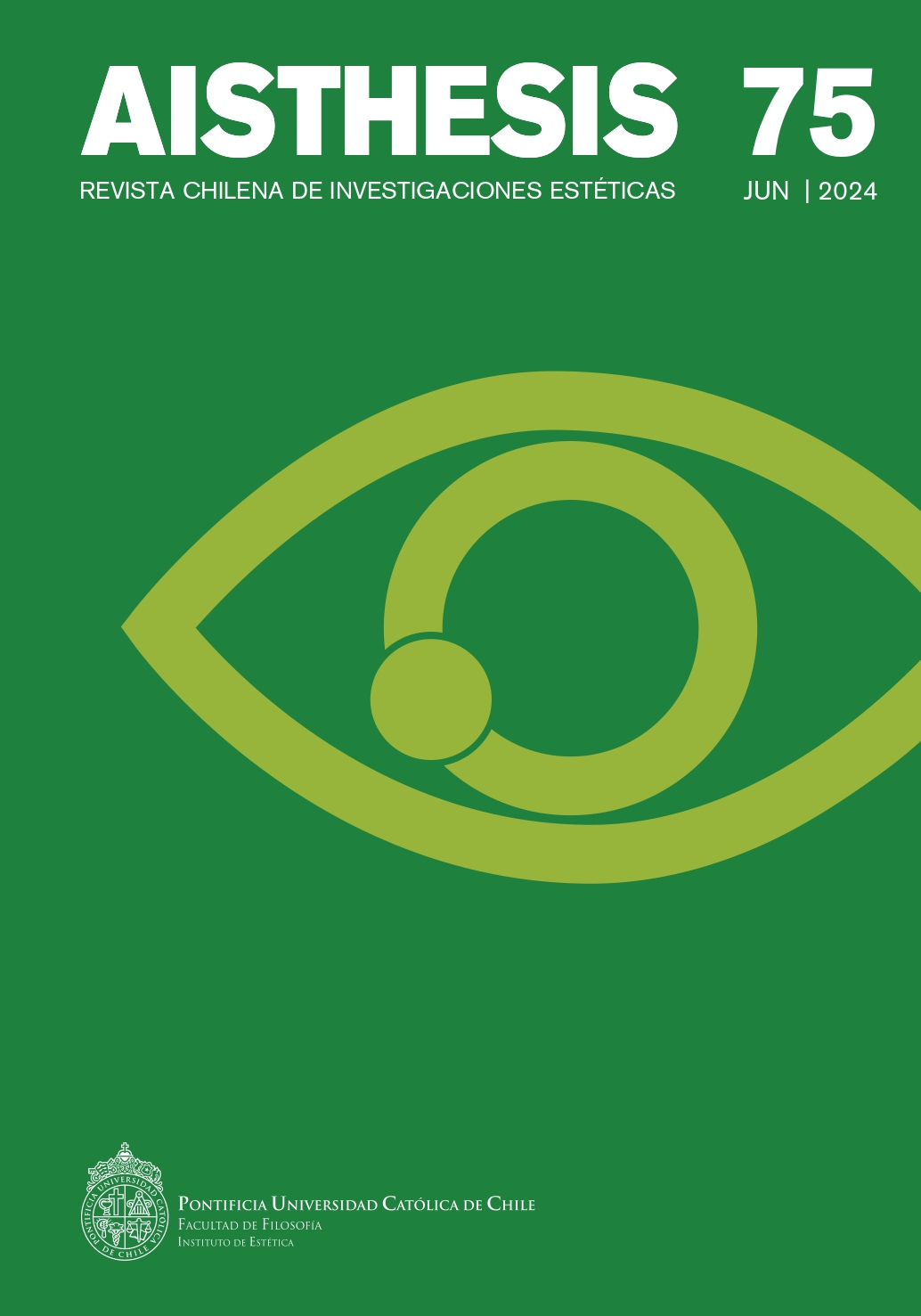Deconstructing Febres-Cordero. Aesthetic-Political Resignification of Visual Archives of the Newspaper El Telégrafo
Main Article Content
Abstract
The recent history of Ecuador is addressed, focusing on the figure of former president León Febres-Cordero, based on two projects carried out with the students of the Film School of the University of the Arts of Ecuador. In Delirar el archivo we start from the Deleuzian formula "writing is a form of delirium" in order to reread the images of Guayaquil's past. In Remontar la historia, likewise, a critical-creative methodology is used to redefine the visual archives of the newspaper El Telégrafo through recontextualizations in public space. The analysis of these audiovisual pieces allowed the configuration of a typology of images (erasure-image, mimetic-image, mixed-image, image-architecture and image-sculpture) and a series of principles on the use of files: openness, intertextuality, multiplicity, reflexivity and memory.
Downloads
Article Details

This work is licensed under a Creative Commons Attribution-NonCommercial-ShareAlike 4.0 International License.
All contents of this electronic edition are distributed under the Creative Commons license of "Attribución-shareAlike 4.0 Internacional" (CC-BY-SA). Any total or partial reproduction of the material must mention its origin.
The rights of academic works published in this publication belong to their authors., who grant to AISTHESIS: Revista Chilena de Investigaciones Estéticas the license for its use. The management of the permits and the authorization of the publication of the images (or of any material) that contains copyright and its consequent rights of reproduction in this publication is the sole responsibility of the authors of the articles
References
Referencias
Abril, Gonzalo. «Tres dimensiones del texto y de la cultura visual». IC Revista Científica de Información y Comunicación, nº 9, 2012, pp. 15-35. Disponible en: http://institucional.us.es/revistas/comunicacion/9/art_1.pdf Doi: http://dx.doi.org/IC.2012.i01.02
Auerbach, Erich. Mimesis La representación de la realidad en la literatura occidental. Fondo de Cultura Económica, 2014.
Barber, Gabriela y Marcos Lafluf. «New Media Art; un abordaje al videomapping». Blucher Design Proceedings, vol. 2, nº 3, 2015, pp. 283-291. Disponible en: https://www.proceedings.blucher.com.br/article-details/new-media-art-un-abordaje-al-videomapping-22330. Doi: 10.5151/desprosigradi2015-70184
Barthes, Roland. Lo obvio y lo obtuso. Paidós, 1986.
Benjamin, Walter. Libro de los pasajes. Akal, 2005.
Blümlinger, Christa. «Leer entre las imágenes». La forma que piensa. Tentativas en torno al cine-ensayo, coord. Antonio Weinrichter. Departamento de Cultura y Turismo-Institución Príncipe de Viana. Colección Punto de Vista, 2007, pp. 50-63.
Bouhaben, Miguel Alfonso. «Ensayo sobre la descomposición y recomposición de las imágenes, los textos y los sonidos en Le Gai Savoir (Jean-Luc Godard, 1968)». Aisthesis, nº 56, 2014, 11-26.
Comisión de la Verdad. Informe de la Comisión de la Verdad. Tomo 1. Violaciones de los Derechos Humanos. Comisión de la Verdad Ecuador, 2010.
Deleuze, Gilles. La imagen-movimiento. Paidós, 1986.
––. La imagen-tiempo. Paidós, 1987.
––. Crítica y Clínica. Anagrama, 1996.
––. Bacon o la lógica de la sensación. Arena Libros, 2000.
Deleuze, Gilles y Félix Guattari. Mil mesetas. Pre-textos, 2004.
Didi-Huberman, George. «El archivo arde», 2007, pp. 1-13. Disponible en: https://filologiaunlp.files.wordpress.com/2012/05/el-archivo-arde1.pdf
Eco, Umberto. Obra abierta: forma e indeterminación en el arte contemporáneo. Seix Barral, 1992.
Geraci, Noah, y Michell Caswell. «Developing a Typology of Human Rights Records». Journal of Contemporary Archival Studies, nº 3, 2016, pp. 1-26
Gutman, David. Somos derechos y humanos. Sudamericana, 2015.
Hegel, Georg Wilhelm Friedrich. Fenomenología del espíritu. Fondo de Cultura Económica, 2017.
Laclau, Ernesto. La razón populista. Fondo de Cultura Económica, 2012.
Le Goff, Jacques. Fragmentos para una historia del cuerpo humano. Taurus, 1992.
Lopate, Phillip. «A la búsqueda del centauro: el cine-ensayo». La forma que piensa. Tentativas en torno al cine-ensayo, coord. Antonio Weinrichter. Departamento de Cultura y Turismo-Institución Príncipe de Viana. Colección Punto de Vista, 2007, pp. 66-91.
Machado, Arlindo. Pre-cine y post-cine en diálogo con los nuevos medios digitales. La Marca Editora, 2015.
Maciel, Katia. Transcinemas. Contra Capa, 2009.
Montúfar, César. La reconstrucción neoliberal: Febres Cordero o la estatización del neoliberalismo en el Ecuador, 1984-1988. Editorial Abya-Yala, 2000.
Mouffe, Chantal. Por un populismo de izquierda. Siglo XXI Editores, 2019.
Nebot, Jaime. Discurso del 23 de mayo de 1985 en la creación de los Escuadrones Volantes. «El discurso que justificó una masacre política». El Telégrafo, 27 de febrero de 2012. Disponible en: https://web.archive.org/web/20210412180205/https://www.eltelegrafo.com.ec/noticias/actualidad/1/el-discurso-que-justifico-una-masacre-politica
Pacheco, Lucas. «La política económica del Gobierno de Febres Cordero». Ecuador debate, nº 8, 1985, pp. 11-32.
Prieto, Martín. «El mejor amigo de Ronald Reagan». El País, 18 enero 1987. Disponible en: https://elpais.com/diario/1987/01/19/internacional/538009213_850215.html
Rappaport, Joanne. La política de la memoria: Interpretación indígena de la historia en los andes colombianos. Universidad del Cauca, 2000.
Solís, Cristina. «Post Comisión de la Verdad: expresiones artísticas y emergencia de sentidos». Foro. Revista de Derecho, nº 31, 2019, pp. 55-73. Disponible en: https://revistas.uasb.edu.ec/index.php/foro/article/view/805 Doi: https://doi.org/10.32719/26312484.2019.31.3
Tamayo, Eduardo. Gobierno de León Febres Cordero (1984-1988): resistencias al autoritarismo. Agencia Latinoamericana de Información, 2008.
Tinel, François-Xavier. Las voces del silencio: resistencia indígena en Chimborazo en tiempos de León Febres Cordero, 1984-1988. Editorial Abya Yala, 2008.
Trouillot, Michel-Rolph. Silencing the Past. Power and the Production of the Past. Beacon Press, 1995.
Vernant, Jean-Pierre. Mito y tragedia en la Grecia antigua. Grupo Planeta, 2002.
Walley, Jonathan. Paracinema: Challenging Medium-specificity and Re-defining Cinema in Avant-garde Film. The University of Wisconsin-Madison, 2005.
Youngblood, Gene. Cine expandido. Universidad Nacional de Tres de Febrero, 2012.
